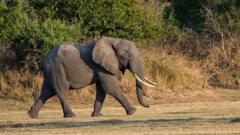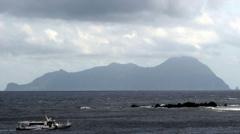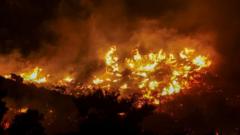Despite the tragic events, some local businesses and travelers believe in a gradual healing process.
**Tourist Return to Pahalgam: A Balancing Act of Hope and Trepidation**

**Tourist Return to Pahalgam: A Balancing Act of Hope and Trepidation**
In the wake of a deadly attack, Pahalgam sees cautious optimism as tourists begin to return.
As Pahalgam grapples with the aftermath of a harrowing militant attack that claimed 26 lives, the picturesque town is witnessing a small resurgence of tourism. Following a week of chaos post-assault, an air of quiet desolation has slowly given way to sporadic signs of life in the once bustling streets. Shops that were boarded up and hotels emptied are now, though cautiously, beginning to receive visitors again.
The attack, which occurred on a scenic day at the popular Baisaran meadow, shocked the nation and sparked outrage throughout India. As tensions have reignited between India and Pakistan, each side has issued retaliatory responses, hinting at a potentially volatile future for the region. Historically plagued by violence since an insurgency erupted in 1989, the targeted killing of tourists is a rare tragedy that has rattled both local communities and tourists alike.
Tourism, a critical pillar of Pahalgam's economy, is under threat as business owners express concern over the long-term impact on their livelihoods. Akshay Solanki, a tourist from Mumbai who was present during the attack, described an atmosphere of “panic” among his group. However, many have chosen to continue with their plans to visit, motivated by the high costs of returning home amidst uncertain flight availability.
Local residents and business operators are advocating for tourists to stay and support the area, with Bollywood actor Atul Kulkarni visiting soon after the incident to encourage people not to abandon their travel plans. Despite assurances from locals and rising tourism campaigns, apprehension looms large, with many questioning how quickly Pahalgam can return to its former vibrancy.
“Most of us are left with no choice,” one shawl seller lamented, reflecting on fears of diminished sales should fear keep tourists away. Nonetheless, the dedication of locals shines through as they reach out to visitors, emphasizing that they responded with compassion in the wake of the crisis.
The travel and tourism industry faces uncertainty, as cancellations from major cities soar—around 80 to 90% for certain operators post-attack. Observers note that perceptions of safety will take time to rebuild and that budding investment prospects may sag if the current environment persists. In a recent legislative session, the state’s chief minister expressed sorrow over the tragic events, appealing for empathy towards the victims while assuring tourists that local communities had come to the victims' aid in their time of need.
Kashmir's beautiful landscapes, historical significance, and cultural richness stand in stark contrast to the shadows cast by recent violence. While the town of Pahalgam begins the challenging path towards recovery, residents, tourists, and businesses alike must navigate the complex interplay of fear and hope for the future.
The attack, which occurred on a scenic day at the popular Baisaran meadow, shocked the nation and sparked outrage throughout India. As tensions have reignited between India and Pakistan, each side has issued retaliatory responses, hinting at a potentially volatile future for the region. Historically plagued by violence since an insurgency erupted in 1989, the targeted killing of tourists is a rare tragedy that has rattled both local communities and tourists alike.
Tourism, a critical pillar of Pahalgam's economy, is under threat as business owners express concern over the long-term impact on their livelihoods. Akshay Solanki, a tourist from Mumbai who was present during the attack, described an atmosphere of “panic” among his group. However, many have chosen to continue with their plans to visit, motivated by the high costs of returning home amidst uncertain flight availability.
Local residents and business operators are advocating for tourists to stay and support the area, with Bollywood actor Atul Kulkarni visiting soon after the incident to encourage people not to abandon their travel plans. Despite assurances from locals and rising tourism campaigns, apprehension looms large, with many questioning how quickly Pahalgam can return to its former vibrancy.
“Most of us are left with no choice,” one shawl seller lamented, reflecting on fears of diminished sales should fear keep tourists away. Nonetheless, the dedication of locals shines through as they reach out to visitors, emphasizing that they responded with compassion in the wake of the crisis.
The travel and tourism industry faces uncertainty, as cancellations from major cities soar—around 80 to 90% for certain operators post-attack. Observers note that perceptions of safety will take time to rebuild and that budding investment prospects may sag if the current environment persists. In a recent legislative session, the state’s chief minister expressed sorrow over the tragic events, appealing for empathy towards the victims while assuring tourists that local communities had come to the victims' aid in their time of need.
Kashmir's beautiful landscapes, historical significance, and cultural richness stand in stark contrast to the shadows cast by recent violence. While the town of Pahalgam begins the challenging path towards recovery, residents, tourists, and businesses alike must navigate the complex interplay of fear and hope for the future.






















